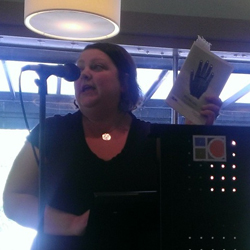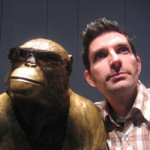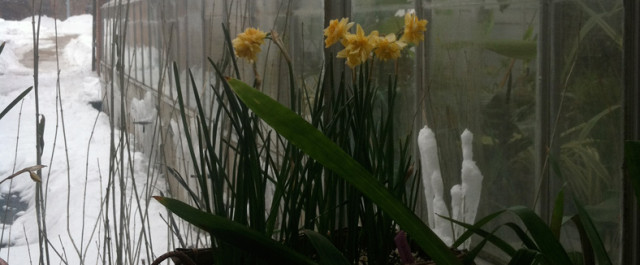Kathleen Nalley
At the conclusion of an alumni weekend during the Converse College MFA residency, I sat with three friends/colleagues/fellow alum who gathered for one final moment before parting (again) to return to our respective homes after a fun-filled, raucous, inspiring time.
As we reflected on various moments, all of us anticipating and dreading the impending depression that results from returning to the “real world,” the thought for this blog post struck me.
What’s more fitting, I thought, than to write about the friendships of writers? Most of us have heard stories of Hemingway and Fitzgerald, Capote and Lee, Ginsberg and O’Hara, but what of the friendships forged between emerging writers today?
So, with a nod to novelist and educator extraordinaire, Leslie Pietrzyk, who often uses the Top 10 format to convey tips and advice to students, I present to you:
The Top 10 Reasons Why Writers Make the Best Friends
10. They know a lot about things you didn’t realize you were interested in. Writers expose you to a wide variety of brain fodder: from the Epic Rap Battle series to the nesting habits of sparrows to how fast a Cadillac can accelerate in 0.2 seconds. Whether it’s the life cycle of squirrels, chinchillas in space, the chemical reaction of rust, nanotechnology, theatre, history, engineering, social media, robots, revolutionary women of the 16th century, backpacks, synesthesia, the type of tree grown in the southernmost region of Sicily, or the mating habits of spiders, you learn, through osmosis, just by hanging out with them.
9. They are protective. Writers will steal events and characters from your life, but they will always, always, always change the names.
8. They do not judge or criticize you. Are you self-conscious? Have an ugly zit on the end of your nose? Feel compelled to wear the same black t-shirt every day? Have daddy issues? Talk to ducks? No matter! Writers praise your faults, embrace your idiosyncrasies, and adore you as you are. In fact, writers often understand your impulses and motivations better than your therapist (and usually offer several potential conflict resolutions for the small price of a paperback).
7. They are generous. Writers put aside their feelings of jealousy to shamelessly promote your latest project on Facebook, fund your Kickstarter campaign, or retweet your Tweets. They also tell you about contest/fellowship/job/grant opportunities that will place the two of you in direct competition. Ever see a stockbroker give another stockbroker an inside tip so he has the potential to make more money? Yeah…a writer will do that.
6. Despite popular opinion, they are low maintenance. You may only see a writer friend once a year, twice if you’re lucky. (But the time you spend together is exciting, engaging, and memory-making enough to fill the gaps in between.) Further, writers rarely say goodbye, preferring to disappear into the shadows and drift away while you aren’t looking — making those typical, awkward, teary farewells nonexistent.
5. They understand rejection. Multiple times a year/month/week/day, writers receive the dreaded email that begins, “We loved your piece, but it is just not right for our journal at this time.” Such frequent communication primes them to be the perfect sounding board when your marriage fails, your dog refuses to come when called, your credit application for a new refrigerator is denied, or your family disowns you for living in the basement and playing Call of Duty 24/7, although you’re 43 and have a Master’s degree. Writers know what it feels like, man.
4. They are uber-productive, respectable citizens. Most writers maintain several jobs to barely eek out a living — teaching, writing, submitting, freelancing, reviewing, copyediting, raising kids, maintaining a household, waiting tables, cleaning toilets, etc., etc. While many writers schedule sleeping, they still make time for you (see #6.).
3. You can bring them to Thanksgiving. Writers become temporary experts on the details du jour — Fibonacci sequences, KISS song lyrics, metallurgy, gemstone properties, Greek architecture, cancer metastasis, etc., because, inevitably, such details will bring a character to life or become a metaphor for cultural deterioration in a capitalist market. Writers can talk someone’s ear off on just about any topic, saving you from having to explain why you’re not married, why you’re not employed, and/or why you’re not providing the anticipated grandchildren any time soon.
2. They are like those people you rolled your eyes at but secretly envied in high school. 97.5% of writers actively seek out the nearest karaoke bar and aren’t shy about wailing “Hotel California,” “Toxic,” and “Smells Like Teen Spirit” back-to-back, no matter the makeup of the audience, no matter how well s/he can sing. (Another curious note: writers often break into spontaneous song while walking up stairs, while in the bathroom, giving a reading, and/or in the middle of a workshop). A writer forces you out of your comfort zone, and you will be all the better for it.
And last, but certainly not least,
1. They know where to find the best and cheapest drinks. And if going out is not an option, writers will give you their last beer, just like the shirts off their backs.
 Kathleen Nalley received her MFA from Converse College in 2012. Nesting Doll, winner of the S.C. Poetry Initiative Prize, was published in 2013. Her poetry has appeared in The Bitter Southerner, Country Dog Review, Emrys Journal, Real South magazine, and several other journals. She currently serves as Poetry Editor of South85 Journal and teaches English at Clemson University. This year, she hopes to win the lottery, gain equality for women, narrow the income/class gap, and/or publish a full collection of poems — not necessarily in that order.
Kathleen Nalley received her MFA from Converse College in 2012. Nesting Doll, winner of the S.C. Poetry Initiative Prize, was published in 2013. Her poetry has appeared in The Bitter Southerner, Country Dog Review, Emrys Journal, Real South magazine, and several other journals. She currently serves as Poetry Editor of South85 Journal and teaches English at Clemson University. This year, she hopes to win the lottery, gain equality for women, narrow the income/class gap, and/or publish a full collection of poems — not necessarily in that order.










